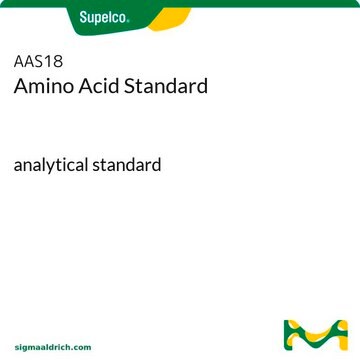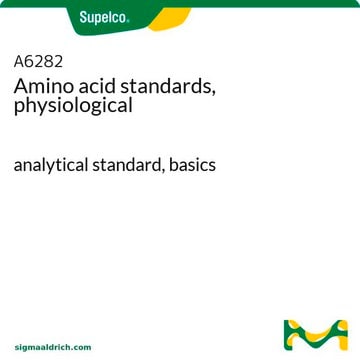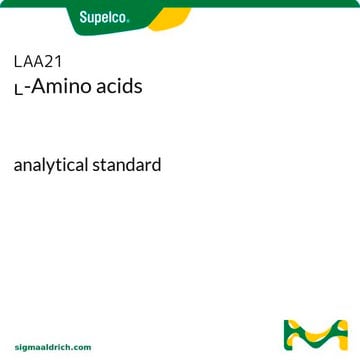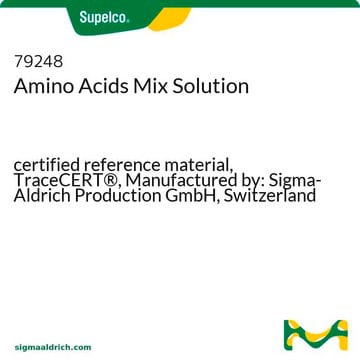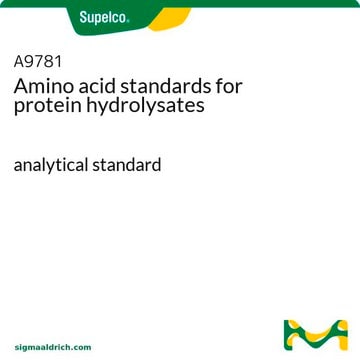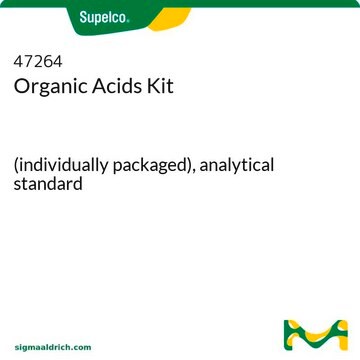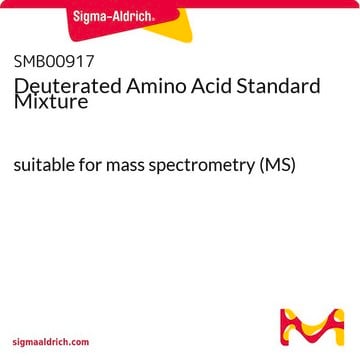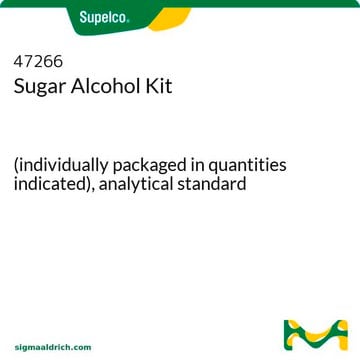A9906
Aminosäurenstandards, physiologisch
analytical standard, acidics, neutrals, and basics
Anmeldenzur Ansicht organisationsspezifischer und vertraglich vereinbarter Preise
Alle Fotos(1)
About This Item
Empfohlene Produkte
Qualität
analytical standard
chemische Klasse(n) des Analyten
amino acids, peptides, proteins
Methode(n)
HPLC: suitable
gas chromatography (GC): suitable
Farbe
colorless
Anwendung(en)
food and beverages
Format
neat
Lagertemp.
2-8°C
Suchen Sie nach ähnlichen Produkten? Aufrufen Leitfaden zum Produktvergleich
Anwendung
Weitere Informationen zur geeigneten Instrumententechnik finden Sie im Analysenzertifikat des Produkt′s. Weitere Unterstützung erhalten Sie vom technischen Kundendienst.
Komponenten
Der Aminosäurestandard enthält die folgenden Komponenten.
- L-Alanin
- Ammoniumchlorid
- L-Arginin
- L-Asparaginsäure
- L-Cystin
- L-Glutaminsäure
- Glycin
- L-Histidin
- L-Isoleucin
- L-Leucin
- L-Lysin
- L-Methionin
- L-Phenylalanin
- L-Prolin
- L-Serin
- L-Threonin
- L-Tyrosin
- L-Valin
- β-Alanin
- L-α-Amino-n-buttersäure
- γ-Amino-n-buttersäure
- DL-β-Amino-isobuttersäure
- L-Anserin
- L-Carnosin
- L-Citrullin
- L-Kreatinin
- Cystathionin
- Ethanolamin
- L-Homocystin
- δ-Hydroxylysin
- Hydroxy-L-prolin
- 1-Methyl-L-histidin
- 3-Methyl-L-histidin
- L-Ornithin
- Sarcosin
- Taurin
- L-Tryptophan
- Harnstoff
Sonstige Hinweise
Aminosäuren und verwandte Verbindungen liegen in 0,2 N Lithiumcitrat, pH 2,2 (mit 0,1 % Phenol und 2 % Thiodiglycol) mit 0,5 μmol/ml vor.
Ähnliches Produkt
Produkt-Nr.
Beschreibung
Preisangaben
Lagerklassenschlüssel
12 - Non Combustible Liquids
WGK
WGK 2
Flammpunkt (°F)
Not applicable
Flammpunkt (°C)
Not applicable
Choose from one of the most recent versions:
Besitzen Sie dieses Produkt bereits?
In der Dokumentenbibliothek finden Sie die Dokumentation zu den Produkten, die Sie kürzlich erworben haben.
Kunden haben sich ebenfalls angesehen
Eli K Moore et al.
Frontiers in microbiology, 6, 637-637 (2015-07-16)
Microbial decomposition of organic matter is an essential process in the global carbon cycle. The soil bacteria Pseudopedobacter saltans and Flavobacterium johnsoniae are both able to degrade complex organic molecules, but it is not fully known how their membrane structures
Diogo Antonio Alves de Vasconcelos et al.
The Journal of nutritional biochemistry, 70, 202-214 (2019-06-25)
L-Glutamine (L-Gln) supplementation has been pointed out as an anticatabolic intervention, but its effects on protein synthesis and degradation signaling in skeketal muscle are still poorly known. The effects of L-Gln pretreatment (1 g kg-1 day-1 body weight for 10
Huibin Qin et al.
Frontiers in microbiology, 7, 1311-1311 (2016-09-10)
Suanzhou as a traditional Chinese gruel is fermented from proso millet and millet. The biochemical analysis showed Suanzhou had relatively high concentrations of lactic acid, acetic acid, and free amino acids. The metagenomics of Suanzhou were studied, with the analysis
Petronia Carillo et al.
Food chemistry, 292, 166-175 (2019-05-06)
Compositional characterization was performed on seven 'Pomodorino del Piennolo del Vesuvio' (PPV) tomato landraces, a signature product of Campania (Italy) threatened by genetic erosion. Characterization encompassed determinations of macro-minerals, soluble carbohydrates, starch, acidity, lycopene, polyphenols, anthocyanins, protein and free amino
Patricia Mitry et al.
European journal of clinical nutrition, 73(5), 692-702 (2018-07-19)
Dietary intake of red and processed meat has been associated with disease risk. Since dietary intake assessment methods are prone to measurement errors, identifying biomarkers of meat intake in bio-samples could provide more valid intake estimates. We examined associations of
Unser Team von Wissenschaftlern verfügt über Erfahrung in allen Forschungsbereichen einschließlich Life Science, Materialwissenschaften, chemischer Synthese, Chromatographie, Analytik und vielen mehr..
Setzen Sie sich mit dem technischen Dienst in Verbindung.